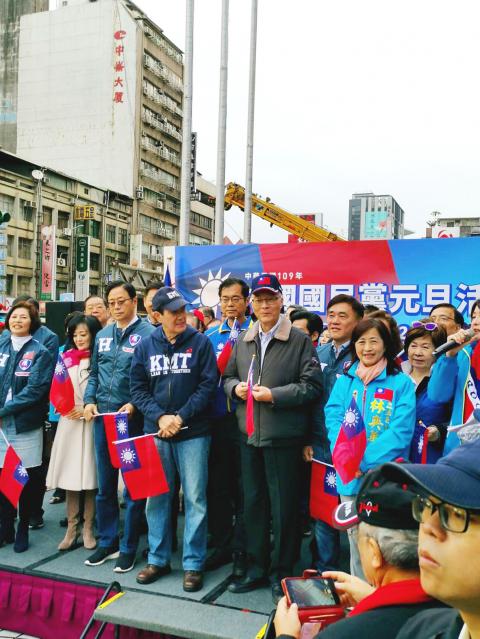Kaohsiung Mayor Han Kuo-yu (韓國瑜) yesterday vowed to review the newly passed Anti-infiltration Act (反滲透法) if he is elected president and the Chinese Nationalist Party (KMT) regains control of the Legislative Yuan.
The act is “a bad law” that would cause fear among the public once in effect, the KMT presidential candidate told reporters in Tainan.
“If I am elected president and the KMT regains a majority in the legislature, we would definitely review the act to ensure that Taiwanese can live without fear,” Han said.

Photo: Shih Hsiao-kuang, Taipei Times
The passage of the act on Tuesday by the Democratic Progressive Party (DPP)-controlled legislature is an example of the “tyranny of the majority,” he said.
When the DPP was a minority party in the legislature, it often criticized the KMT using its legislative majority to push through bills, he added.
“Now we see the DPP doing the same thing, only in a worse manner: The act passed a first reading without undergoing an initial review and the Executive Yuan did not even offer an alternative version,” Han said.
“What is most unbelievable is that President [Tsai Ing-wen (蔡英文)] directly ordered its passage,” he said, adding that the way the act was passed was unacceptable to the public.
Earlier at a flag-raising ceremony in Tainan, Han compared the passage of the act to tying a bomb to people’s necks, saying that it allows the DPP to “blow up” anyone it chooses.
“The DPP must think clearly — do you want people to vote for you because they love you, or vote for you because they fear you?” Han said.
Separately yesterday, former premier Simon Chang (張善政), Han’s running mate, said at a flag-raising ceremony at KMT headquarters in Taipei that the passage of the act was “the darkest day in the history of the Republic of China since its democratization.”
The act’s passage went against the will of the Taiwanese public, he said, adding that most look forward to seeing it reviewed.
Former president Ma Ying-jeou (馬英九), who was also at the event, said: “The passage of the Anti-infiltration Act means the return of the Martial Law period.”
Last month, National Taiwan University professor Su Hung-dah (蘇宏達) was summoned for questioning by police after criticizing the National Palace Museum’s renovation plan in a video he posted on Facebook, Ma said.
As a frequent critic of the act, “I might be next [to be summoned for questioning], but I am not scared, because the Anti-infiltration Act is unconstitutional,” he added.
The Mainland Affairs Council said that the passage of the act was both necessary and in line with public expectations.
It aims to protect national security, social order and Taiwan’s democracy from external threats, the council said, adding that similar legislation has been passed in the US, Germany, Canada, Australia and New Zealand.
The act only punishes people who make political donations, lobby for a political cause, campaign for a political candidate, upset social order or spread disinformation to influence elections under the instruction or sponsorship of a foreign government or organization, it said.
Businesspeople, academics and students engaging in normal cross-strait exchanges would not be affected, it added.
Additional reporting by Chung Li-hua and Lai Hsiao-tung

Alain Robert, known as the "French Spider-Man," praised Alex Honnold as exceptionally well-prepared after the US climber completed a free solo ascent of Taipei 101 yesterday. Robert said Honnold's ascent of the 508m-tall skyscraper in just more than one-and-a-half hours without using safety ropes or equipment was a remarkable achievement. "This is my life," he said in an interview conducted in French, adding that he liked the feeling of being "on the edge of danger." The 63-year-old Frenchman climbed Taipei 101 using ropes in December 2004, taking about four hours to reach the top. On a one-to-10 scale of difficulty, Robert said Taipei 101

Nipah virus infection is to be officially listed as a category 5 notifiable infectious disease in Taiwan in March, while clinical treatment guidelines are being formulated, the Centers for Disease Control (CDC) said yesterday. With Nipah infections being reported in other countries and considering its relatively high fatality rate, the centers on Jan. 16 announced that it would be listed as a notifiable infectious disease to bolster the nation’s systematic early warning system and increase public awareness, the CDC said. Bangladesh reported four fatal cases last year in separate districts, with three linked to raw date palm sap consumption, CDC Epidemic Intelligence

Two Taiwanese prosecutors were questioned by Chinese security personnel at their hotel during a trip to China’s Henan Province this month, the Mainland Affairs Council (MAC) said yesterday. The officers had personal information on the prosecutors, including “when they were assigned to their posts, their work locations and job titles,” MAC Deputy Minister and spokesman Liang Wen-chieh (梁文傑) said. On top of asking about their agencies and positions, the officers also questioned the prosecutors about the Cross-Strait Joint Crime-Fighting and Judicial Mutual Assistance Agreement, a pact that serves as the framework for Taiwan-China cooperation on combating crime and providing judicial assistance, Liang

US climber Alex Honnold left Taiwan this morning a day after completing a free-solo ascent of Taipei 101, a feat that drew cheers from onlookers and gained widespread international attention. Honnold yesterday scaled the 101-story skyscraper without a rope or safety harness. The climb — the highest urban free-solo ascent ever attempted — took just more than 90 minutes and was streamed live on Netflix. It was covered by major international news outlets including CNN, the New York Times, the Guardian and the Wall Street Journal. As Honnold prepared to leave Taiwan today, he attracted a crowd when he and his wife, Sanni,